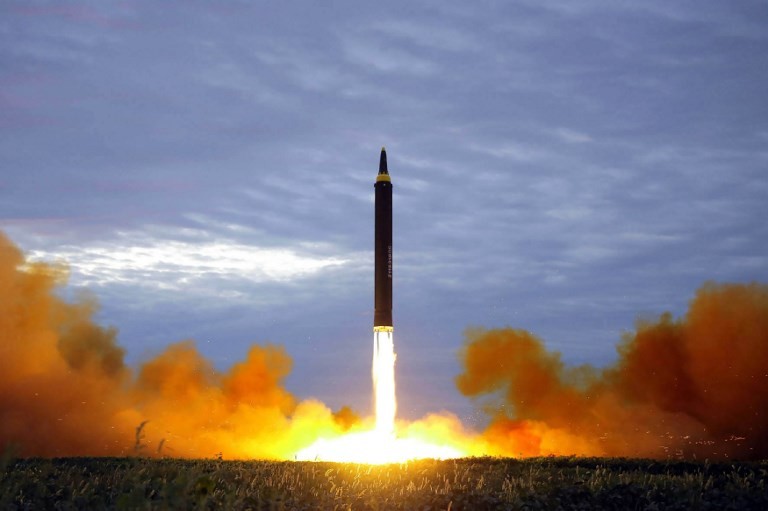Popular Reads
Top Results
Can't find what you're looking for?
View all search resultsPopular Reads
Top Results
Can't find what you're looking for?
View all search resultsAsian media react to North Korea bomb test
North Korea tested what it says was its first hydrogen bomb over the weekend drawing condemnation from countries across the world. Here is a roundup of related headlines.
Change text size
Gift Premium Articles
to Anyone
 This picture from North Korea's official Korean Central News Agency (KCNA) taken on August 29, 2017 and released on August 30, 2017 shows North Korea's intermediate-range strategic ballistic rocket Hwasong-12 lifting off from the launching pad at an undisclosed location near Pyongyang. (Agence France -Presse/STR/KCNA)
This picture from North Korea's official Korean Central News Agency (KCNA) taken on August 29, 2017 and released on August 30, 2017 shows North Korea's intermediate-range strategic ballistic rocket Hwasong-12 lifting off from the launching pad at an undisclosed location near Pyongyang. (Agence France -Presse/STR/KCNA)
A
n article in the Korea Herald said that the test brings North Korea closer to becoming a full-fledged nuclear state.
"With Sunday’s nuclear test, North Korea is seen drawing increasingly closer to becoming a full- fledged nuclear weapons state, which would further unsettle Northeast Asia’s geopolitical landscape and may escalate risks of a military standoff.
State media said the test was designed to chiefly examine the technology to adjust the explosive power of a hydrogen bomb to be mounted on an intercontinental ballistic missile. As a result, it proved the high reliability of the device’s mutually reinforcing fission-fusion reactions."
The Herald in a separate article said that the United States and South Korea had agreed to most powerful sanctions against North Korea after the tests.
"Foreign Minister Kang Kyung-wha and US Secretary of State Rex Tillerson had 25-minute talks to discuss countermeasures after North Korea earlier in the day conducted what it called a successful test of a hydrogen bomb that can be mounted onto an intercontinental ballistic missile.
Tillerson affirmed that the US will place the strongest-ever sanctions on North Korea based on its alliance with South Korea."
The Japan News reported that Prime Minister Shinzo Abe joined calls for tougher sanctions against the North calling the tests 'totally unacceptable.'
"In a statement issued after the meeting, Abe said, “[The test] is totally unacceptable for Japan,” noting that the U.N. Security Council has repeatedly condemned the North’s ballistic missile launches this year. The prime minister said Pyongyang’s nuclear and missile development has reached “a new stage of threat to Japan’s security with even more severity and urgency.”
Meanwhile, an editorial in China Daily asks what comes next after the nuclear test noting that the international community has in the past failed to show a united front when dealing with Pyongyang.
"It's high time, therefore, that the DPRK realized the devastating consequences of using that space to further its missile/nuclear programs and the stakeholders considered Pyongyang's genuine needs, especially food and national security, because whatever nonpublic concerns they may have, all the stakeholders share one genuine, and growing, concern: the threat those programs pose to them, the region and beyond. If they do not work together to check the DPRK now, they will find it increasingly difficult to do so as time passes by, because Pyongyang will not stop doing what it believes is safe to do."









